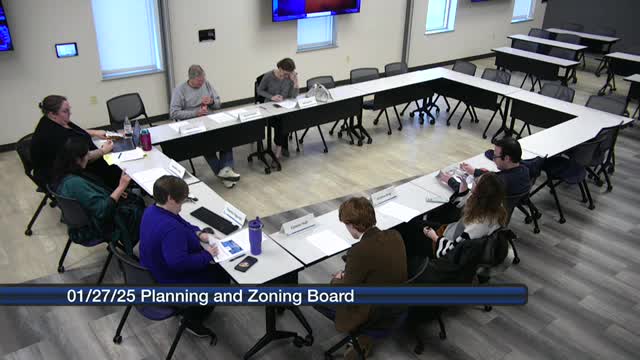Denton Zoning Board of Adjustment reviews powers, quorum rules and elects chair and vice chair
Get AI-powered insights, summaries, and transcripts
Subscribe
Summary
City of Denton zoning board members received an overview of the board’s authority under state law and local code, including appeal timelines, variance standards and quorum rules. The board approved Dec. 16 minutes and elected Member Lane as chair and Connor as vice chair by voice vote.
The Denton Zoning Board of Adjustment on Monday reviewed its duties under Texas law and the Denton Development Code, received guidance on appeals and variances, and elected Member Lane as chair and Connor as vice chair.
City staffer Hillary Negra opened the overview by summarizing the ZBA’s statutory basis and procedural duties. "The ZBA is a body specifically authorized under the Texas local government code, to hear and decide things relating to the strict application of a city zoning ordinance, as well as to consider appeals to administrative decisions," Negra said, pointing members to Texas Local Government Code section 211.008 and the city code materials provided in the meeting packet.
Negra told members the board must follow the Texas Open Meetings Act and that typical ZBA actions include hearing appeals of administrative decisions, granting variances to numeric zoning standards, and deciding certain sign-code exceptions. She reviewed several numeric and timing rules — for example, the board must have 75% concurrence of its regular membership to decide many matters (for Denton’s seven regular seats that typically requires six concurring votes), an appeal of a ZBA decision to district court must be filed within 10 days, and appeals to the board itself must be filed within 20 days of the administrative decision and decided within 60 days of filing.
Why it matters: The briefing clarified what kinds of cases should and should not be taken to the ZBA (for example, the board cannot change the set of land uses authorized in a zoning district and cannot use a variance to authorize a prohibited use). Staff emphasized that variances are property-specific, may expire after 24 months if not acted on, and can include conditions to protect public health, safety and welfare. Those procedural limits affect when applicants, neighbors and other municipal departments can seek review and where disputes may ultimately be litigated.
During discussion members asked about standing and who may appeal decisions. Negra explained that appeals can come from applicants, property owners within a statutory notice radius (200 feet for project-related appeals, as described in the city code), or other municipal departments in limited circumstances, and that courts will examine whether administrative remedies were exhausted.
Staff also warned members about Open Meetings Act constraints: one-off conversations that, taken together, create a quorum can become an unlawful "walking quorum," and the city provides sitting email addresses for official communications to help with public-records management.
Votes at a glance
- Approval of Dec. 16 minutes — Motion to approve made and seconded; approved by voice vote (no opposed recorded). Motion text: "Approve the December 16 minutes." Mover: not specified; Second: not specified. Outcome: approved (voice vote). Notes: recorded as a voice vote during the meeting.
- Election of chair — Member Lane nominated and approved by voice vote. Motion text: "Nominate Member Lane as chair of the Zoning Board of Adjustment." Mover: not specified; Second: not specified. Outcome: approved (voice vote).
- Election of vice chair — Connor nominated and approved by voice vote. Motion text: "Nominate Connor to continue as vice chair." Mover: not specified; Second: not specified. Outcome: approved (voice vote).
What was decided and what remains directional
The meeting did not resolve any appeals, ordinances or variances; it was largely an orientation and organizational meeting. Staff committed to send the slides and reference materials provided during the briefing to board members and to follow existing timelines and submission requirements when appeals or variance applications are filed.
Clarifying details provided during the meeting included the ZBA’s composition (seven regular members, up to three alternates; two-year staggered terms), the 75% concurrence rule for deciding cases based on seven regular members, appeal and decision timelines (20 days to file an appeal to the board, 60 days to decide, 10 days to appeal a board decision to district court), and that variances expire after 24 months if unused. Staff emphasized that the ZBA’s decisions create binding precedent for subsequent staff determinations until overturned by appeal or by a change in law or code.
Looking ahead staff said members may be asked to attend off-schedule meetings if scheduling is necessary to meet statutory timelines for appeals. The briefing closed with staff offering to provide the slides and follow-up materials to any members who missed the meeting. The board adjourned after the organizational items and the informational briefing.
